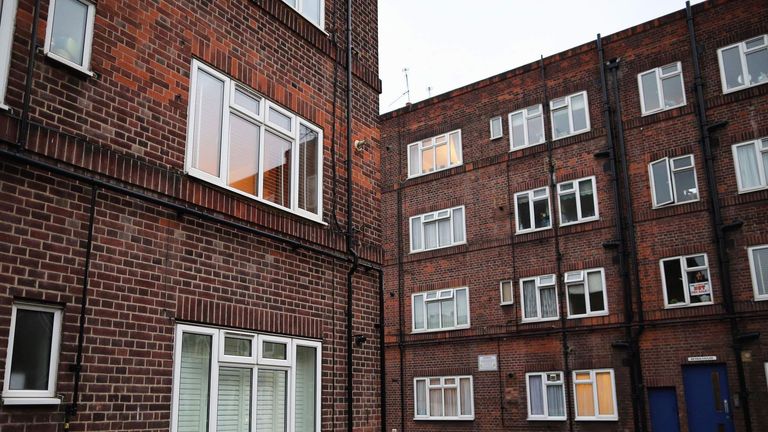End working class prejudice rather than focusing on social mobility
More social mobility isn't the answer at this stage, Dr Lisa McKenzie argues in this examination of class.
Monday 24 September 2018 10:58, UK
National Inclusion week, which runs from 24-28 September, is an annual opportunity to raise awareness of inclusion in the workplace.
Sky has partnered with Inclusive Employers to highlight the everyday practical ways an inclusive environment can be created in your workplace.
Sky News has asked writers from a diverse background to explain why the issue of inclusivity is important to them.
Here, Dr Lisa McKenzie, author of Getting By: Estates, Class and Culture in Austerity Britain, looks at social mobility.
Social mobility has been a political concept that all parties feel they can get behind.
It's a term that everyone can get behind - we all want more social mobility don't we?
I would argue no.
Social mobility means that a select few of working class people are able to transcend their class position if they can conform to a middle-class life and middle-class values.
I have heard from academics, politicians and the general public that their "class baggage" must be left behind.
"Class baggage" when dissected means family background, values, meaning and understandings of community and life experience.
:: Creative arts vital for a child's sense of inclusion
I argue class and the concept of social mobility is much more than educational attainment, wealth or earnings, but is also about culture, values, community and family.
Let me explain.
When you are walking down your high street you see a young lad coming in the opposite direction, hands in his tracksuit pockets, pulled right down beyond the elastic of his boxer shorts, cap pulled down you can barely see his face, and his hood is up.
He's tugging at a thick leather lead with his Staffy on the other end seemingly trying to get away.
What do you see and how are you reading those cultural markers of tracksuits, baseball caps and Staffordshire bull terriers?
You are in a supermarket and you notice a bit of a commotion going on.
A young girl with a baby in a pushchair is shouting at the security guard and is telling him to stop following her around the shop.
She has her hair tied back in a tight pony tail, has a big puffa jacket on, big gold hooped earrings and her face - despite her young years - looks worn out. How are you reading this situation?
These are two actual scenarios that has been recounted to me by respondents in my research, as examples of how they are "class judged".
The young lad is taking his beloved dog to the vets. The young mother has finally snapped when for the third time that day she is being treated as someone not to be trusted in a shop.
This is what class prejudice looks and behaves like every day. I call it death by one million acts of symbolic violence.
We know and are aware of racial prejudice, gender bias, and discrimination based on religion, sexuality and disability - not that we are any nearer to reaching a point where people are treated equally and with respect despite their differences.
Class prejudice goes unseen and unspoken.
It behaves prejudicially as if it is "natural" that the lower orders do not have the same levels of intelligence as those from "better" homes.
This doesn't just happen to working class people who are in "their space" working in the warehouses, the call centres, the supermarkets and cleaning the offices.
This class-based prejudice happens on every level to those who are working class.
I am a working-class academic. I have a PhD. I work at a university.
You would think that I might have some protection of those "as if in natural" prejudices - after all social class is all about wealth, earnings, and job status isn't it?
Social class is about all of those things but it is also about the cultural, social and symbolic connections we have.
It is because I grew up on a council estate, had a baby has a teenager, left school at 16 with no qualifications and worked in a factory making tights for 10 years, that now as a working-class academic, I am viewed with suspicion.
How did I get in? Did someone feel sorry for me?
My grammar is corrected, so is my pronunciation of the French social theorists whose names I sometimes mis-pronounce.
As a working-class woman "out of my natural space" I will also feel like a interloper, and to some extent be treated as one.
The everyday prejudices that working-class people experience in every aspect of their lives, from the healthcare they receive to where and under what circumstances they are employed, runs deep in British society to the point that it is in fact invisible.
It is hidden amongst the narrative of "it's just what they are like".
Lastly what I want us to understand from those everyday class prejudices is that the term social mobility only adds and cements those prejudices as legitimate.
I don't want any more social mobility.
I want the working class to be free from prejudice and allowed to rise together.





